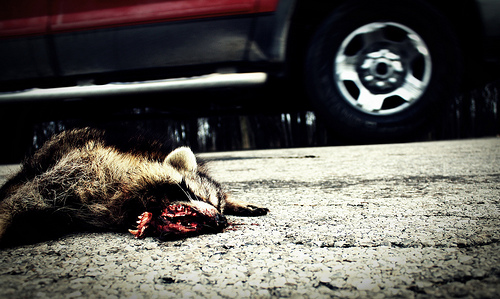
In the spring of 2003, I went to Haiti for the first time with a group from our church. Like almost everyone who visits a developing country, I had my eyes opened and my heart stretched. There was plenty that was tragic, lots that was overwhelming, some that was appalling. And there were also so many things honorable, admirable, and generous. Plodding donkeys, palm trees and dusty patience made me imagine that this is how first-century Palestine must have felt.
Returning home, I faced that conundrum we have all known after some milestone or mountaintop. How do I hang on to this experience? How do I keep from being lulled back into my comfortable and neglectful old ways? At the same time I didn’t want to talkshow it into the ground, pronouncing that I was changed, when I knew in two months I’d be pretty much back to normal.
I chose dead squirrels, victims of the perilous traffic of Pella, Iowa to be my personal reminder to pause, remember Haiti, visualize some the school children I had met there, and offer a sentence prayer for them. There are more squished squirrels here than you might think. Being run over must by far be their leading cause of the death.
For nine years now this has worked pretty well. I haven’t won the Nobel prize for my work in Haiti, but neither have I completely forgotten the people there and my experience with them. The flattened squirrels have done their job. So much so that this spring, I expanded my project.
Now when I’m on longer drives—on the interstate or the nostalgic, homey routes that crisscross rural Iowa—I keep an eye out for roadkill. Lots of raccoons. Plenty of possums. Rabbits, skunks, deer. Sadly, some cats and dogs. Birds—even hawks. And the occasional turtle. At each one I try to think of some specific place or people who are suffering. The people of Syria. AIDS orphans in Africa. Prisoners in my county jail. Schoolgirls in Afghanistan. The guy begging at the freeway exit. It gets to be a challenge. At times, the dead creatures can come faster than I come up with people to pray for. Sometimes I’m reduced to “all those who are dying.” Sometime I just have to quit. I never thought I’d be so relieved to discover the lump up ahead is just a chunk from tire blowout.
I’m afraid all this sounds so morose, even morbid, as to be suitably Reformed. But I’m pretty sure this isn’t about a fascination with or even lionization of suffering. We’re all familiar with insulating ourselves from pain with alcohol or shopping, ensconcing ourselves in leather interiors and air-conditioned abodes. But as I get older I find it fairly easy to escape and avoid in much healthier ways, a good book on my back deck while listening to the wrens and cardinals. Yes, the typical tragedies of congregation life—cancer, divorces, troubled kids—intrude. But I don’t see torture chambers or bullet holes very often.
The crushed creatures by the roadside are about the messiest and most physical disturbance my life has to face. Their deaths seem to contain the same elements of so much of the world’s sorrow. More than a little stupidity, a large dose of fear, some being in too much of a hurry to be bothered, and oftentimes a measure of callousness. Sometimes it’s pretty grisly, flattened beyond recognition. At other times, it’s more poignant—a deer, alive and lithesome only hours ago, now contorted, snapped, and bloody. In my sanitized middleclass life, they are especially capable of helping me to hear again the groan of all creation, and then stirring me to prayer. Probably one of the few things that unstrings me more is ten minutes spent in the family lounge outside the ICU. Fortunately, I don’t have go there as often as I see a squished raccoon.
Don’t know your driving habits or the wildlife in your region. But if you’re looking to keep a little disequilibrium in your life and pray more often, keep an eye out for roadkill.
(Photo by ClickFlashPhotos / Nicki Varkevisser)

